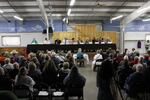
Some say the occupation is the elephant in the room at many candidate events. At the first of several Harney County candidate forums, the pre-written questions avoided any mention of the occupation.
Amanda Peacher / OPB
People in Harney County may be back to their old routines now that the armed occupation of the Malheur National Wildlife Refuge is over. But there’s a tension in the air that wasn’t there before.
"It feels different," said Maria Iturriaga, a retired county clerk who was vehemently against the occupation. For her, the anxiety she felt during the occupation still lingers.
"You know, even now I even find myself looking over my shoulder for some reason," she said. "And I know there's nothing to worry about now."
Aside from conversations with close friends, even some interactions with people she knows are different. "There's something there," said Iturriaga. " I don't know if it's distrust, or cautious."
That same kind of tension is also coming through in the local primary elections. There are more candidates for two open county leadership seats than any other primary election in recent history.
Seven candidates are seeking an open county commissioner seat, including incumbent Dan Nichols, who decided to run for reelection at the last minute because of everything the county had been through with the occupation.

Former County Clerk Maria Iturriaga says she's never seen so many candidates on the ballot in Harney County.
Amanda Peacher / OPB
And four people, including current County Commissioner Pete Runnels, are running for the county judge seat vacated by Steve Grasty, who vocally opposed the occupation.
During the 16 years that Iturriaga served as clerk in the county of 7,200, she said most races included one or two candidates if a position was open. But usually it's just the incumbent on the ballot.
"This year there are candidates to choose from, which is very unusual," Iturriaga said. "In my opinion some of the people who are running are not qualified to hold a county office, or any office."
Most of the candidates filed after the start of the occupation. With so many people throwing their hat in the ring, the overarching election question is: Did candidates oppose the occupation, or do they sympathize with the mission of the militants?
Most candidates say that they didn't agree with the occupation outright, but others say it helped highlight failings of current federal and local government.
Now, Harney County is awash with speculation. Rumors about candidates pop up in Facebook threads or grocery store conversations. For many residents, the occupation has had big effect on how citizens think about their vote.
"You just really have to do your homework this time," said Pauline Braymen, a retired journalist. She worried that the community could elect a candidate who might try to claim control over federal lands or encourage ranchers to tear up their grazing rights.
"I'm afraid of what might happen if people who are elected have the same philosophies as the Bundys brought to us," she said.
Related: 41 Days: An OPB Documentary On The Oregon Occupation
Since it’s not always obvious where candidates stand, Brayman looked for clues in the election rhetoric.
"‘Constitution’ is the first word that you look for,” she said, noting the occupiers’ claim that the constitution doesn’t allow federal ownership of public lands. She also scoured voter pamphlets and other campaign materials for signs that candidates want to turn public land over to state or local control.
But many of the so-called Bundy sympathizers in Harney County say Ammon Bundy’s leadership was educating and inspiring.
“It’s amazing what you can do when you wake up,” said Duane Schrock, a rancher who considers Ammon Bundy a close friend.
Before meeting Bundy last fall, Schrock wasn’t involved in the community or local politics. This will be the first time he’s voted in a local election since moving to Harney County five years ago.
“I kept my head in the sand. I didn’t care,” he said. “I didn’t think it made a difference. I didn’t think I could make a difference.”
Schrock isn’t voting for any of the incumbents, in part because of how they handled the occupation: “I have a bad taste in my mouth for the way this county has been run,” he said.
Instead, he's voting for candidates who say they support more local management of federal lands.
"People have just gotten used to 'what it is, what it is,' and they didn't think they could make a change," said Schrock. "Well, everybody wants change now. There's a lot of people paying attention."
Schrock's neighbor, Ken Bentz, has the opposite take on the occupation. He opposed everything about it, and saw the occupation as driven by outsiders who didn't represent the community at all. But Bentz, who's also a rancher, agreed that the drama attracted a new slate of candidates.
"I think some of the people who are running specifically because they have decided that it's time that they got involved," Bentz said. "Which in and of itself is a good thing."
Related: Malheur Occupation Trial Could Last For Months
But he said he thinks some of the candidate’s goals overreach county jurisdiction, which he pointed out is mostly about balancing a budget. When something major happens such as the occupation, the county leaders are important figureheads. But most of their job is about things such as funding the library, economic development proposals, or zoning decisions.
“This is county government which actually for the most part is a pretty boring sort of endeavor,” said Bentz. “I mean it's just like operating a business.”
There’s never been a formal poll of Harney County resident’s attitudes toward the occupation.
People on opposite sides claim that most everyone else agrees with them. Bentz does see some division in the community between occupation opponents and sympathizers. He said far more people disagreed with the occupiers' mission to turn federal lands over to local control.
"It's portrayed often as a kind of a split down the middle," Bentz said. "That is not the case."
So with candidates both for and against Bundy's mission on the ballot this Tuesday, the primary election could be telling. So far, Harney County has one of the highest percentages of ballot returns in the state. In a community where life is different than a year ago, Harney County residents seem determined to have a vote in their future.
